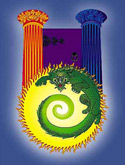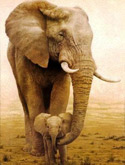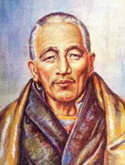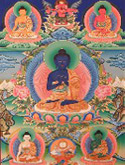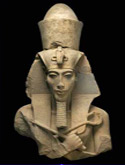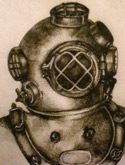Scorpio 2005: Scorpio and the Seventh Hydra of Pride
 Keynote
Keynote
“Warrior I am, and from the battle I emerge triumphant.“
Scorpio and the Seventh Hydra: Pride
The Definition of Pride
Pride and Knowledge
Pride in the Zodiac Signs, Planets, Houses and Rays
The Vanity of Humanity
Scorpio and the Seventh Hydra: Pride
PRIDE GOES BEFORE A FALL
“If you allow yourself to become full of pride, you will find yourself
humiliated. Be modest. Pride goeth before destruction, and an haughty
spirit before a fall. Better it is to be of an humble spirit with the lowly,
than to divide the spoil with the proud.”
“THE THIRD AND FOURTH (races) BECAME TALL WITH PRIDE. WE ARE THE KINGS, WE ARE THE GODS … [from the Stanzas of Dzyan] Such were the first truly physical men, whose first characteristic was – pride! It is the Third Race [Lemurians] and the gigantic Atlanteans … which found an objective form in those … giants, those terrible sorcerers and magicians … ” [Commentary on the Stanzas]1
As the forgoing passage alludes, pride has been around for a long time in the human race, ever since it was endowed with the “spark of mind” some twenty odd million years ago; in other words, ever since humans have been able to think, they have had pride.
We usually associate pride astrologically with Leo, but Scorpio is the sign of the fixed cross that brings together the testings for initiation from all the fixed signs – Taurus, Leo, Scorpio and Aquarius.
Hence the battle of Hercules with the nine-headed hydra [dragon] in the foetid swamp of Lernea, is one of the most significant of the twelve labours. Scorpio is the sign of the world disciple, struggling to gain mastery over the lower self in order to attain Liberation through soul control.
The nine heads are three groups of three, representing the testing of the physical, astral and mental planes. These three groupings also relate to illusion in its three forms and are connected to the three tiers of the heart lotus, the knowledge, love and sacrifice petals. Hence,
|
Plane |
Heads of the Hydra |
Unconscious Quality |
Heart Lotus Petals |
| Physical | Sex, comfort, money. | Maya | Knowledge |
| Astral | Fear, desire for power, hatred. | Glamour | Love |
| Mental | Pride, separativeness, cruelty. | Illusion | Sacrifice (Will) |
Thus it can be seen how physical experiences over many lives relate to the unfoldment of the knowledge petals; how the astral is a lower reflection of the love principle and how the mental is a lower expression of will. This table provides a structure within which to view the theme of pride and its relation to other hydra heads.
The Definition of Pride
1. high or inordinate opinion of one’s own dignity, importance, merit, or superiority, whether as cherished in the mind or as displayed in bearing, conduct, etc.
2. the state or feeling of being proud.
3. becoming or dignified sense of what is due to oneself or one’s position or character; self-respect; self-esteem.
4. pleasure or satisfaction taken in something done by or belonging to oneself or conceived as reflecting credit upon oneself: civic pride.
5. that of which a person or a body of persons is proud: he was the pride of the family.
6. the best or most admired part of anything.
7. the most flourishing state or period: in the pride of manhood.
8. a company of lions.
9. mettle in a horse.
10. Archaic splendour, magnificence, or pomp.
11. Archaic ornament or adornment.
12. Obsolete sexual desire, especially in a female animal.2
Most pertinently, the above table shows how pride is related to illusion, in fact it is literally illusion; it is related to the acquiring of ideas and their interpretation plus the unfolding sense of discrimination between the real and the unreal.
Pride presents as an exaggerated sense of self, a puffed-up pomposity, an inflated ego; it is present in all humans in varying degrees and so there are subtle forms of pride. Pride is the mental identification of one’s knowledge as self. Hence pride is part of the illusory ahamkara, (the feeling of egotism, Self, or I-AM-NESS).
Pride goes before a fall because the inflated ego must return to Earth – from its sel-appointed high place. Icarus cannot fly so close to the Sun without the wax melting in his wings. In returning to Earth (humus) one is humiliated, brought down to Earth; mired in the bog of Lernea.
Pride prevents us being who we truly are. It stops us from finding the true SELF because the illusory ahamkara has taken over and is present. Pride distorts reality because it is an illusion. Pride breeds separativeness, one of the three mental hydras. When one carries pride, it separates us from our fellows; hence pride breeds its illigitimate child condescension, who “looks down its nose” or from afar in its ivory tower.
Pride exists in very obvious forms and as an aspect of the shadow or Dweller, it is always hard to see – much easier to see in everyone else! Pride is related to fear (one of the astral hydras) and low self-esteem, hence the two extremes of inferior and superior: low self-esteem and pride; this is dealt with beautifully in The Science of the Emotions by Bhagavan Das.
Pride and Knowledge
The degrees of pride all relate to the right interpretation of knowledge (as mentioned earlier) and/or identification with that knowledge. Wisdom sees through pride as a result of applied knowledge in everyday life.
Knowledge is relative, and a little of it can be a dangerous thing. To be informed on a daily basis, we gain a relative knowledge that can be completely accurate, grossly untrue or some shade of grey between the two extremes. We may resonate with that knowledge and it may be the only knowledge we have. Resonance is not necessarily the truth, usually an aspect of the truth – it all depends upon our developed discrimination. This can be applied to all aspects of living and life as the sum total of our experiences and interpretation through our veils of illusion.
Continually informing ourselves and keeping an open mind, being willing to modify or completely transform our ideas is a good antidote to pride. Pride only manifests when there is attachment and over-identification with our ongoing understanding of unfolding knowledge or sense of self, whether that be physical, emotional or mental.
If knowledge is absorbed without right discrimination, then illusion is compounded; if knowledge is identified as self then pride is created – an inflated or unrealistic sense of self – the not-self.
In the exchange and sharing of knowledge, pride is the great impediment. If too much pride is present then engagement in true dialogue does not take place. When pride preaches monologues, definitive pronouncements and unassailable statements or arguments, there is prevention any deeper exploration between the two parties. If through pride one has a vested interest in protecting one’s cherished theories or ideas, then dialogue does not occur and no listening takes place because the ahamkara is threatened and fearful.
Dialogue is of course about listening, learning, speaking and informing; mutually exchanging information that benefits both parties; they both become enriched and reach a deeper understanding. This can only be achieved if true humility, that great antidote for pride, is present and active (not the affected version!). Otherwise, one must eventually eat the humble pie that was left out of the diet!
Using the humus analogy again, both dialogues are “on the ground”, “standing under” any residual ego present so that “under-standing” will eventually supervene. To use masonic symbolism, they meet “on the level”, and in Arthurian parlance, sit equally at the round table.
Swelled Dweller
swanning forth
in her flowing robes
weighed down
by the leaden thread
of pride,
she glides
titanically
the grumpy empress …
harrumph! harrumph!
billowing sails
puffed up
by the hot air
of self-acclaim
she steers a course
toward shallow shoals
and dangerous rocks.
Pride in the Zodiac Signs, Planets, Houses and Rays
As noted earlier, Leo is the sign of pride as the Bard relates:
“AJAX. Yes, lion-sick, sick of proud heart. You may call it melancholy,
if you will favour the man; but, by my head, “tis pride.”3
“QUEEN. What, is my Richard both in shape and mind
Transform’d and weak’ned? Hath Bolingbroke depos’d
Thine intellect? Hath he been in thy heart?
The lion dying thrusteth forth his paw
And wounds the earth, if nothing else, with rage
To be o’erpow’r’d; and wilt thou, pupil-like,
Take the correction mildly, kiss the rod,
And fawn on rage with base humility,
Which art a lion and the king of beasts?
KING RICHARD. A king of beasts, indeed! If aught but beasts,
I had been still a happy king of men.”4
At the root of Richard’s tyrannizing ways was his pride, pride that was only enhanced by the flattery of his leading subjects. Unabashed flattery and copious compliments are always a sure indicator of the presence of pride.
Power of the mental faculty is where Leo’s power resides, expressed through the “mane of the mental body” and yet also the agent of separation.
As Pride is an aspect of the Dweller and the “non-sacred” planets are a vehicle for its expression (especially the Moon), those who suffer much from pride may have the Moon, Mars, Pluto in Leo. Yet any “non-sacred” planets in Leo such as Pluto and Mars can have a similar effect.
However pride in its many facets can be seen in all the signs. Other signs of note are the fire signs which complete the triplicity of which Leo is part – Aries and Sagittarius. Fire is the symbol of manas or mind. Mars as ruler of Aries has already been mentioned and Jupiter as ruler of Sagittarius is another major contender for the “over-blown ego” syndrome. Interestingly Jupiter and the Sun are the co-rulers of the second ray of Love-Wisdom, known for the prideful glamour, “contempt for the mental limitations of others”.
Capricorn (which rules the knees) is also another sign noted for pride, in its ambition to succeed and control over matter; its ruler Saturn has a close association with intelligence and mind, bringing the wayward disciple to his or her knees when required. Capricorn also has a close esoteric association with Leo, “the Lion and the Unicorn”.
A strong fifth house in the horoscope (Sun, rulers of the rising sign) can also indicate predisposition to pride. The average person who “lives in the houses” more than in the signs, will be quite prone to this lowest common denominator. But it is not uncommon for many disciples to experience it, particularly if they are polarised in the solar plexus centre. The solar plexus is the fifth centre counting down, corresponding to the fifth sign Leo, and is where the “beast of the jungle” roams. The solar plexus is the “lair” of the Dweller that seeks to maintain the status quo of temporal power.
There are also aspects or angles in a chart that are more conducive for the expression of pride, such as Sun square Jupiter or Mars opposite Mercury. These are some of the more obvious traits but if every sign was combed through, pride could be uncovered. Virgo is another sign, with its mental dexterity and precision, yet may not be so obvious with its somewhat retiring manner that masks pride. Interestingly, Oscar Wilde called pride itself a mask:
“But I will tell you this about inauthenticity: pride is a mask. Behind it you will always find something else; sometimes another mask, more often than not merely sorrow. Sorrow is not a mask for anything, sorrow merely is. That is its truest hardship. It is also its greatest virtue. In sorrow you have no choice but to see things and people as they really are.”
The inauthentic self, the imposter etc. whose sorrow derives from an innate sense of not being able to link to the soul and experience that joy. The above passage also refers to the earlier statement describing how a sense of low self-esteem can breed pride as a counter-balance, as well as the earlier Shakespearean passage referring to melancholy.
Still on the self-esteem theme, pride has varying degrees of expression. We may take pride in our work and this can be healthy in maintaining certain standards, but the trick is to somehow walk that fine line of dis-identifying with what we are so closely involved. People take pride in their appearance to the point of vanity – another progeny of pride; some even pride themselves on their humility!
One of pride’s other wayward offspring is Narcissus, who fell into a pool and drowned after falling in love with his own reflection. The West in general is very narcissistic, constantly pre-occupied with body-image and the lesser self. The darker side of pride and its consequences finds its expression in the following poem:
Outlands
(21-03-04)
these deep interiors
resound roundly
cavernous and black …
groping into the grand
ballroom of shadows
whose phantom dancers
glide silent
over the onyx
darkly gleaming
with what light
is seeming …
I know these faces,
self-sentenced
prisoners on permanent
day-leave
shackled by smugness …
they think they have
me snugly pegged
with ill-disguised guile
these petty lilliputians
so scared and scarred
by the lead-tipped
lash of pride
and the stinging salt
of their own conceit
attack
even the proffered hand
of brother love …
generous, to a fault
so precarious
self-esteem
does not totter,
does not diminish
is not found wrong
(is always right)
endlessly justifies,
props up
the presented image …
this gaggle of narcissi
come to slurp and gaze
at some muddy pool
in drought
serving out their exile
unrepentant.
The seven rays have various pre-dispositions toward the expression of pride. The first and fifth rays are obvious contenders (or should that be offenders?!) and interesting that they are the only rays that pour through Leo. The second ray has already been noted and students may wish to explore the others in this light.
More Ditties and Haikuesques on Pride5
pride struts
puffed up
across a stage
built for one
pride glides forth
with fat sails
filled by the wind
of its own flatulence
pride shores up
with rotten beams
the shaky edifice
of low esteem
pride
is an obese person
choking
on the excresence
of their own excess
pride
comes before a fall …
that which must
inevitably intervene
as the gravity of it all
is neither understood nor seen.
Another few random quotes on pride by others:
Pride goeth before destruction, and an haughty spirit before a fall. Better it is to be of an humble spirit with the lowly, than to divide the spoil with the proud.
To Thomas More the English philosopher, pride is “the root of all mischief.” He struggled mightily against it in himself, seeing that pride is the greatest obstacle to the use of reason in decision-making. He saw clearly that the “empty splendour” of high office could bring about one’s downfall.
“I can see his pride
Peep through each part of him.”
Henry VIII 1.1.68-9, Abergavenny to Buckingham.
“My pride fell with my fortunes.”
As you like It 1.2.242, Rosalind to Orlando.
“So proud that Bolingbroke was on his back!
That jade hath eat bread from my royal hand;
This hand hath made him proud with clapping him.
Would he not stumble? would he not fall down,
Since pride must have a fall, and break the neck
Of that proud man that did usurp his back?”
Richard II 5.5.86-91, Richard.
“You sign your place and calling, in full seeming,
With meekness and humility; but your heart
Is cramm’d with arrogancy, spleen, and pride.”
Henry VIII 2.4.118-20.
“I will not jump with common spirits,
And rank me with the barbarous multitudes.”
The Merchant of Venice 2.9.31-2, Prince of Aragon.
“Being so great, I have no need to beg.”
Richard II 4.1.309, Richard to Bolingbroke.
“He that is proud eats up himself: pride is
his own glass, his own trumpet, his own chronicle.”
Troilus and Cressida 2.3.152-4, Agamemnon to Ajax.
“I do hate a proud man as I do hate the engendering of toads.”
Troilus and Cressida 2.3.156, Ajax.
“Pride went before, ambition follows him.”
2 Henry VI 1.1.179 Salisbury to Warwick.
“The man’s undone forever; for if Hector break not his
neck i’ the combat, he’ll break’t himself in vain-glory.”
Troilus and Cressida 3.3.271-3, Thersites to Achilles.
“Why, he’ll answer nobody: he professes not answering;
speaking is for beggars, he wears his tongue in’s arms.”
Troilus and Cressida 3.3.280-1, Thersites to Achilles.
The Vanity of Humanity
“He tried in vain” is a phrase that illustrates the unsuccessful attempt to achieve something, not necessarily through one’s shortcomings or even pride for that matter. Yet there is somewhat of a theme of prudence, of knowing one’s limitations that is implied. Those who are puffed-up with pride will not know their limitations, flying perilously close to the Sun like Icarus, having the mental constructs upon which they have soared, melt and bring them back to Earth – with a thud.
This is a deeply philosophical theme as from one viewpoint that is what Humanity is meant to do, to reach the solar heights and become imbued with higher consciousness. It is the fine line we tread between Jovian expansiveness and Saturnian caution and restraint. Some of us are born to be Icarus and reach as far as possible into the Sun, to “steal fire” like our ancient ancestor Prometheus; whilst others take the safer route of eating the garnered fruits of others.
“How has Prometheus got into the possession of the (divine) spark? … Fire having its abode in heaven, it is there he must have gone to find it before he could carry it down to men, and, to approach the gods, he must have been a god himself … Thus the gift made by Prometheus to men was a conquest made from heaven … Prometheus … belongs to that race of Titans who had rebelled against the gods … The allegory of the fire of Prometheus is another version of the rebellion of the proud Lucifer, who was hurled down to the bottomless pit, or simply unto our Earth, to live as man.” (Various sources from The Secret Doctrine)
Pride denies access to the heart. Paradoxically, Leo rules the heart wherein is anchored the life-thread, related to the will, of which the mind is the lower correspondence. The physical heart is also related to the heart chakra, the organ of love, whose lower expression is in the astral body. Pride separates the head from the heart, so that love is only an idea, not a living expression – this is an area where “new agers” and “esotericists” fall foul.
Pride makes its wearer feel omnipotent and is related to power. Pride breeds a sense of power and a sense of power breeds pride. These dangerous bedfellows become partners in crime – neglectful of their duty to spiritual law.
As mentioned earlier, pride, like all aspects of the Dweller, lurks in its stronghold, the solar plexus. It only emerges when it is engaged, particularly when challenged by that which is deemed a threat to its raison d’etre. Then it fights like the marauding beast of the jungle, not like a noble king. It becomes the ty-rant – it rants and raves, kicks and screams, piles rationalisation upon rationalisation; it pouts and is put-out; it is emotionally reactive as it is fed by the solar plexus and all the other unconscious motives masked by pride; it clings desperately to the “truth” with which it is identified – that supports and props up a starved heart.
If this path is pursued tenaciously in a lifetime or over a series of lifetimes, the comparatively mild mood swings of bi-polar develop into the deeply entrenched samskara of schizophrenia; there may be an increasing incidence of this as the Fifth Rootrace develops the mind. Curiously it is exactly in parallel with the time of Individualisation in Lemuria when “humanity were born with pride”, except we are now upon the upward swing, whereas that was the downward swing of the pendulum of time. Pride’s ultimate demise is the creation of separativeness, the “greatest heresy” that many upon the Path experience:
“But when the highly evolved and the most intelligent of the race discover in themselves the divine Flame, and awaken the power of the supreme Controller, seated at the heart of their being, they are very apt to place themselves in a higher category than other people, and to classify those who do not have their mental grasp of the differentiations of the evolutionary development as differing so widely from them as not to deserve the name of Sons of God.
They regard all not working in mental energy as lacking souls and hence as lacking eternal persistence as individuals. This is only a glamour of the mind, is part of the great heresy of separateness, and indicates faintly the coming period wherein the mind will be as dominant and as misleading as is the sentient [astral] body at this time.”6
Separation from the self can be a great disaster on the spiritual path and can create long delays in getting “back on track”; the split in mind but also the separation of heart and mind. Yet the dis-integration of mind is also a healthy remedy for a mind that needs “reformatting” whilst the heart takes emphasis again – slay the mind and awaken the heart.
The danger lies for the disciple, particularly before the third degree initiation (where the control of manas is demonstrated, i.e. pride-free) – when the transfiguration of the personality is undergone. It is the most dangerous stage because of the danger of treading the “left-hand path”.
Indeed, leading up to the stage of deep-seated mental illness, one can be a tool of the materialistic forces who find easy entrance into a deluded mind and hence feed existing illusions. This can in turn poison the disciple’s environment, especially those within their periphery who are less discerning or discriminating; who may be taken-in or in awe – swept into the maelstrom of a powerful personality.
It is said that “a little knowledge is a dangerous thing” and by the same token a lot of knowledge is a far more dangerous thing and encumbers its owner with much responsibility. This is where any “chinks” in the disciples’ armour will compound an existing situation of pride and illusion.
For instance, if the person has not done the requisite personality integration work with the astral body (and many esotericists have not!), then the astral hydras of hatred and desire for power will supervene. If the samskaras within the emotional body are deeply entrenched from this lifetime let alone other lifetimes, then the situation can become most dire. The individual will be his “walking dweller” or a “monster” and no one will be able to reach him or her, so successful has the isolating mechanism of separativeness been.
The monster, like the marauding beast of the jungle, feeds on anything it comes across or is directed at it – it is all fodder for the bottomless pit wherein lurks the voracious dweller; it behaves like all other addictions that emanate from the desire nature (seated in the solar plexus) and there is no satiation; it has become a vortex of dark energy and even vampiristic. If obsession or possession has occurred then “other forces” will enter the feeding frenzy. Grim stuff!
This is the way toward the “eighth sphere” where there is a complete severing of connection with the causal body of the soul. The disciple has then become Darth Vader and joins the ranks of the Dark Brotherhood. So if we want to find out where the “p-ride” finishes, it is at a disused station on a derelict line in the cosmos. It’s all a little dark and heavy, but so very Scorpionic!
Extreme conclusions like the foregoing are relatively rare but becoming increasingly more prevalent in this critical period of the Fifth Rootrace with its mental development. The following passage takes into account that mental diseases and problems will increasingly affect Disciples and Mystics in the future:
“… criticism can be based on many things, but is usually rooted in jealousy, thwarted ambition, or pride of individual intellect. Each member of any group, particularly those in the immediate circle of the leader or leaders, is prone to sit in judgment. … Unvoiced criticism is very dangerous for it is powerfully focussed and strongly, though not individually directed; it issues continuously and as a steady stream, sent forth on the wings of jealousy, ambition, pride in a personal grasp of a supposed situation and a belief that the one who criticises is in a position to understand correctly and could – given right opportunity – take right action. …
From every side and in every group there streams in on the group leader directed criticism, poisonous thoughts, untrue formulated ideas, idle gossip of a destructive kind, the imputation of motives, the unspoken jealousies and hates, the frustrated ambitions of group members, their resentments and their unsatisfied desires for prominence or for recognition by the leader or leaders, their desires to see the leader superseded by themselves or by someone else and many other forms of selfishness and mental pride.”
Pride warnings from 1 to category 5!: Cultivate humility in the daily life. Be vigilant and watchful of the critical and cruel mind and its tendencies to separate and condescend. Listen to the voice of reason, especially those of your peers and co-workers. (Share some humble pie with them occasionally!) Be willing to admit your limitations or aspects of the unredeemed self which keep repeating old unregenerated patterns.
Scorpio-Pluto are the very forces of the regeneration that can occur during this solar period. Try not to follow the point of least resistance and disengage – stay in dialogue. Don’t get caught in idee fixe – try a new perspective.
Be vigilant of skirting around the glamourous and intriguing areas of human foibles – with regards those who have gone before – all with equally fragile vanities. Concentrate on the real work at hand NOW. Work in the safety of the heart, present moment – wonderful moment!
Phillip Lindsay © 2005.
Other Scorpio newsletters.
Subscribe to newsletter.
Donations
Please support this work.
Stripe is supported in many countries.



